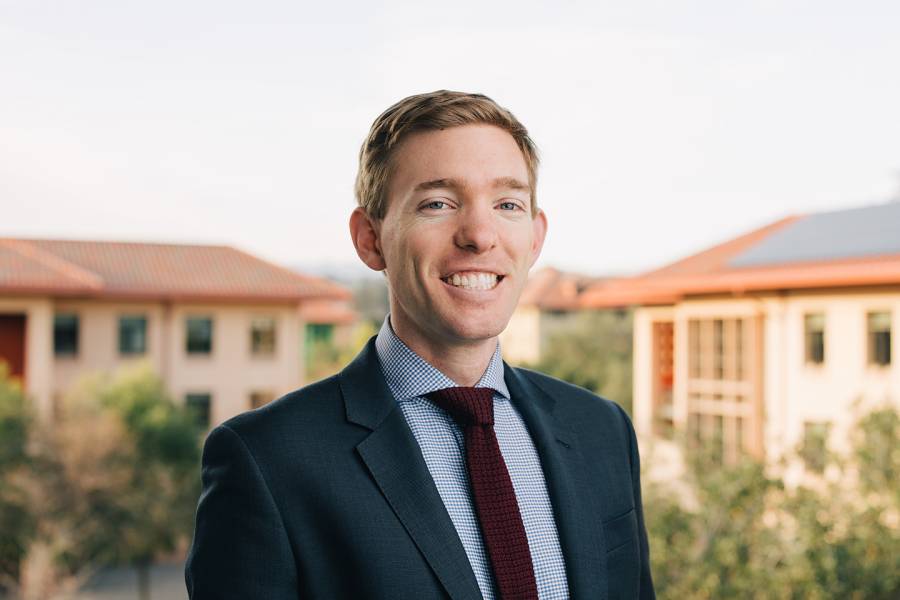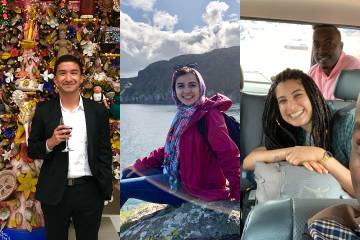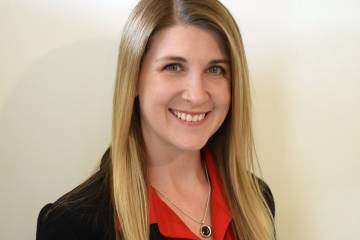With a lifelong interest in leadership and service, Johns Hopkins alum Neil Rens has worked to make health care more accessible, merging his biomedical engineering background with medicine and health economics to create new models for health care delivery. This fall, he will take this pursuit to the next level as a Knight-Hennessy Scholar at Stanford University.
"The ugly truth is that we already ration health care, we just do it based on a person's ability to pay," Rens says. "I prefer a cost-effectiveness approach where we prioritize high-value services and make those affordable for everyone. This approach offers a more equitable and efficient system. On average, outcomes would probably be the same or better than our current system's, but with less disparity in outcomes between people of different means, health literacies, education levels, [and so on]."
Before graduating from Johns Hopkins in 2016 with a degree in biomedical engineering, Rens created an interactive website to educate the public about the Affordable Care Act and co-founded Aezon, a company that made a handheld device capable of diagnosing 15 different diseases. Rens says he was attracted to the project for its potential to "democratize health," making care and diagnosis more accessible for those in low-resource areas. He has since ventured into the policy sector, testifying in favor of vaccine-positive legislation in California.
Now, as he completes his third year of medical school at Stanford, Rens will return to his engineering roots to develop new health care delivery models with his Knight-Hennessy Scholarship. The prestigious award, which will fund his pursuit of an MBA, provides up to three years of funding toward a graduate degree at Stanford and is designed to build a community of future global leaders dedicated to finding creative solutions to the world's greatest challenges. Scholars are selected for their demonstrated academic independence, civic-mindedness, and leadership qualities. The 2020 cohort include 76 scholars.
As a Knight-Hennessy Scholar, Rens will also participate in cohort activities such as an experiential learning tour on civil rights from Selma to Baltimore, which is organized by the JHU-affiliated Thread organization.
"Neil is an outstanding individual whose leadership was amply demonstrated during his time as a student at Hopkins and continues as an active member of our alumni community," says Ed Schlesinger, dean of JHU's Whiting School of Engineering. "All of us at the Whiting School are proud of his recognition, and know he will enjoy significant achievement and success in his career."
While Rens is the first Hopkins affiliate to be named a Knight-Hennessy Scholar, this is not his first time winning a prestigious award. His company Aezon was one of seven finalists for the $10 million Qualcomm Tricorder XPRIZE; at the time, Aezon was a humble team of Hopkins students running against 300 entrants consisting mostly of startups. In 2016, he was named a finalist for the prestigious Rhodes Scholarship, and later that academic year he was awarded a Fulbright grant to pursue an MSc in health economics, policy, and law in the Netherlands, both of which he applied for through JHU's National Fellowships Program.
"I think one of the things that makes Neil stand out is not only his desire to take advantage of every opportunity, but also his ability to manage his time," says Eileen Haase, program chair of Applied Biomedical Engineering at JHU and mentor to Rens. "Neil is also resilient. He has been awarded many honors—but he has also faced rejection. Whenever he misses out on an opportunity, he moves right along and looks for the next one."
In addition to his enterprising spirit, those who know Rens admire him for his heart for service. He has leveraged his opportunities to help those who experience systemic disadvantage; his service work includes spending a summer in Rwanda fixing medical equipment and time spent working as a delegate and vice chair for the American Medical Association and California Medical Association. This spirit for service is reflected in the work Rens looks toward now as a Knight-Hennessy Scholar as he strives to improve the cost-effectiveness and consequent accessibility of health care.
"Visiting other countries and studying their approaches to health care has been enriching and humbling," Rens says. "Each community has its own priorities, and even when there are common goals across countries, their unique cultural contexts necessitate tailored approaches. ... Despite the varied priorities and circumstances, we can gain valuable insights from around the world. I am excited to synthesize these ideas and work with local stakeholders to implement culturally sensitive improvements to health care systems in the U.S. and abroad."
Posted in University News
Tagged fellowships










